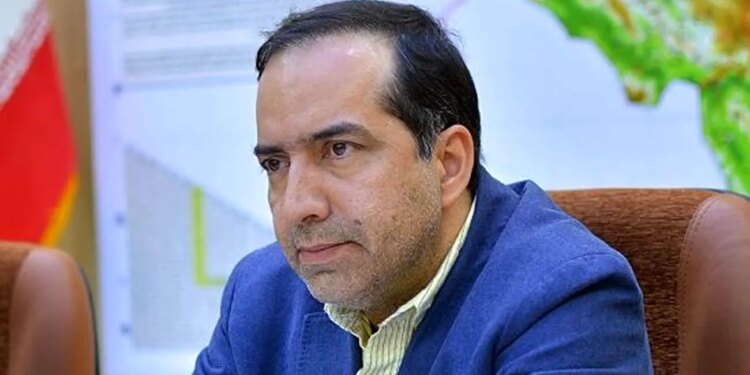Hossein Tazami: The experience of the Prime Minister of a small country with a population of 4 million people, which used to be one of the 15 Soviet republics and after the collapse of the Soviet Union, became independent and is one of the 3 main countries that make up the Caucasus geopolitical region, the gateway to Asia and Europe. Stalin, the legendary leader of the Soviet Union, was born in this region, and Shevard Nadze was the last foreign minister of the Soviet Union, and the first president of this newly independent country.
1- The author’s becoming a minister has a funny story: before becoming a minister, he was only a financial supervisor in a consulting company in the field of energy, without any contact or familiarity with government officials. In the last days of 2003, they called the Prime Minister’s office and called him to a meeting. Probably the Prime Minister was familiar with his views and criticisms through the media. He asks him for a plan and suggests him the Ministry of Energy. This is despite the fact that young Nika was only 28 years old at that time. He goes through the steps of promotion and influence gradually: 3 years as Minister of Energy, 2 years as Minister of Finance, 2 years as First Deputy Prime Minister and finally 3 years as Prime Minister. He will retire in 2012 and start an international consulting company to share his ideas with others.
2- The essence of his formulas is:
Shrinking government, eliminating and simplifying regulations. Obviously, anti-corruption and efficiency and, as a result, economic prosperity and social trust are realized in the shadow of these two. Seemingly small reforms, structural reforms (and even methodological reforms) can bring a big change to the country. During that 8-year period, the government created a great revolution by curbing bureaucracy, reducing the regulatory burden and fighting corruption. In this period, the ease of doing business index went from 112 (in 2006) to 8 (in 2014).
3- The author says: “Our fight against corruption was based on 3 principles, which I suggest that every country that has a firm determination to fight corruption should take advantage of these three principles: considering incentives for public servants, simplifying laws and regulations, and implementing laws without Consider the exception. Furthermore, I believe that limited regulation is the best long-term precaution against the resurgence of corruption. By regulatory constraint, I mean the degree of regulation that maximizes economic growth and reflects the government’s capacity to enforce the laws it enacts. The amount of this restriction varies according to the administrative capabilities and economic performance of each country.
He gives an interesting example: “To get a job like a police officer that pays 20.00 per month Dollar If you had an income, you should have paid a bribe of 2000 dollars. It was a worthwhile investment, however, because you didn’t just live off the monthly salary, you could also take bribes later. Traffic officers bribed their superiors to get more traffic lights and signs built. This was not done with the aim of increasing the safety of the streets, but to increase the opportunity to take bribes. In the global corruption survey, almost 80% of Georgians said that bribery is the main part of their lives.
All traffic police forces (16,000 people) were dismissed in one day in July 2004, and after that, the streets became safer without the presence of the police. In their place, a small group of 2500 people were employed with higher salaries. “If the new forces took bribes, they would be sent to prison.”
4- The anti-corruption approach included another area. Since all government procurements are subject to corruption, with electronic auctions/tenders and the auction method, in addition to the common corruption in the envelope method, they have also maximized the government’s profit.
5- Fatal government slows down the country’s economic development. With extensive adjustment Government employees And directing them to the private sector, firstly, the salaries of the remaining employees were multiplied, which leads to the elimination of bribery, and secondly, government resources are saved, which are used in a productive way. In addition, deregulation is basically an anti-corruption strategy. In a short period of time, the need to obtain business licenses and permits decreased by about 90% (the number of business licenses from 300 to 41 and the number of licenses from 600 to 53). He earned a large part of his income from car exports. How? Easing the import of cars and exporting them to neighboring countries!
– The crisis in the energy sector has been one of the main drivers of dissatisfaction with the previous government and one of the most important reasons for the Rose Revolution. He tells his experiences, how he was able to bring widespread blackouts and even 3 hours of daily electricity in winter to 24-hour electricity in less than 3 years and export electricity to neighboring countries with investment incentives. How to bring it to 96% while the consumers only paid 30% of the electricity consumed (and the rest was subject to party play, corruption, government consumption and wrong vision).
7- The right-wing and one-line dominant narrative of color revolutions in the former Soviet republics is as follows: a man named George Soros, with the support of the United States, has overthrown the legitimate and popular systems of these countries with widespread money-sprinkling and the media during elections, and a handful of Westerners Dependents have replaced Mr. Putin’s friends. This is true to a certain extent, but the Russophile mentality ruling a part of the country’s decision-makers for fear of harming the duality of right and wrong that they have created (the illegitimate West and Putin, peace be upon him) prevents other propositions from being raised in order to reach a more comprehensive analysis. The widespread corruption of the oligarchs, the inefficiency left by the rotten communist system, the Stalinist police and security system, the West-Moscow geopolitical competition, which we can see in the east-facing NATO and the near foreign theory in the Kremlin’s security doctrine, and most importantly, the high amount of corruption and Discrimination made people fed up and obviously they prefer any alternative to the current miserable situation.
8- In the years when the author was the finance minister, taxes were reduced from 21 types to 6 types. Despite this, and at the same time the reduction of some tariffs during the recession, it beat all conventional forecasts: tax revenue rose from 7% to 24% of GDP.
15 types of traditional taxes were bravely removed and 6 taxes remained in 3 categories as follows:
Consumption tax: value added tax (18%) and customs clearance tax (0, 5 and 15%; moreover, more than 80% of imported goods were cleared without paying tax)
Income tax: corporate income tax (profit tax: 20% which was reduced to 15%), dividend tax (5%) and personal income tax (25% which was reduced to 20%).
Property tax: property tax (land tax: maximum 1% of the value)
In addition to these taxes, customs duties were defined for four types of goods: the export of tobacco, gas, alcohol, and scrap metal.
He tells his experience: any progressive tax system (the more you earn, the more money you have to pay) eventually leads to corruption; Because both individuals and companies are creative to pay less tax. In addition, progressive tax rates will harm the successful and prevent citizens from earning more and companies from being profitable.
9- The experience of transformation in the medical system is also significant. A combination of attracting capital and privatization. As it was experienced before in the energy industry. In privatization, he points out an interesting point that is missing in our depictions of privatization: other state-owned companies (and state-owned companies of other countries) should not be chosen as investors of a state-owned company.
10- At the same time, he is focused on how far the privatization should be continued. It means that strategic industries or services should also be privatized or with other formulas (including public-private partnership contracts) to maintain supervision and even state management? But be careful that this right idea does not create the exception of the majority! And the bureaucrats, who are used to centralization, should not label anything as security and the foundation of sovereignty.
11- He, who reduced the tax rate as the finance minister and at the height of inflation, rightly says: in an economic recession, everyone is afraid. Consumers fear unemployment and tax hikes and hold back on spending and saving, resulting in an immediate shrinking of the economy. Fearing instability, private sector activists are holding back on major investments and postponing new hires. These measures prevent the growth of GDP and increase the unemployment rate. Foreign investors go to other countries for fear of losing their capital. In other words, fear is the biggest enemy of the national economy in economic recession. Governments cannot create jobs or drive economic growth alone in the long run. What governments can do. Creating an environment where entrepreneurs have confidence to invest and create jobs; Therefore, the best thing that the government can do in an economic recession is to strengthen stability.
Economic stagnation has a myriad of causes: ineffective government, inadequate regulation, and external factors such as geopolitical issues or trade wars. Regardless of what these causes are, the best thing the government can do is to create a sense of stability and predictability in the economy” and continues: the highest acceptable level of inflation is the rate beyond which savings will increase solely due to inflation. This inflation rate is the level beyond which people and businesses, fearing inflation, begin to reduce spending (reduce consumption) and increase savings. He believes that this rate is different for every country and for Georgia in those years it was 9-10%. have been.
12- He unabashedly criticizes the prevailing economic theories (mostly liberal) and the complex concepts that economists use to explain economic development. As the leader of the country, he has officially swum against the prevailing tide (including in the matter of inflation, stagnation and austerity) and bravely challenges the theory of “central bank independence” to some extent.
13- The author has a realistic view of the nature of foreign loans and is not vain. On this basis, he considers the unplanned and consumerist use of these loans to be the cause of dependence and destitution.
14- Challenging and disrupting the traditions that have been revelatory only comes from fearless people. Therefore, the author and his co-thinkers are examples of “reverse thinking” who had the courage to see another way and act on it. This is the approach that has shaped all developments in human history, both in the field of thought and industry: the history of anything is not necessarily a sign of its authenticity. Ignorant Arabs referred the rightness of idolatry to their ancestors. One of the effects and perhaps the solution of “reverse thinking” is the famous story of Newton and the apple falling from the tree, which led to the discovery of the law of gravity.
15- In the 2012 report of the World Bank, the following factors are mentioned for the success of Georgia:
– Political will to deal with corruption
– Validation of this determination in the early stages
– Serious implementation of anti-corruption law, especially for managers
– Recruiting and hiring new employees
-Using unconventional methods
– Common goal and coordination
– Using international experiences at the financial and regional level
– Effective use of technology
– Strategic use of communication
16- Let’s also remember that a part of Georgia’s leap is indebted to the extensive help of the West, especially the European Union. It’s natural that they don’t notice Moscow’s invasion of Georgia, and by immediately holding conferences, they send a wave of political support and economic incentives to this ally (and an applicant for membership in NATO and the Eurozone). In other words, good coal has not been unaffected in the jump of Georgia, but firstly, the rise of the initial significant changes occurred between 2004 and before the invasion of Russia (2008) and secondly, the presence of a team that can use the aid in its place is a sign of supply. Is.
17- He says that the failure to reform the judicial system was not the only reason for the failure of the ruling party in the 2012 elections, and he believes that the successes had created an unhealthy sense of the need to continue reforms at the head of the reform group.
18- The author does not shy away from criticizing some of his policies or actions because his goal is that the next person will follow this path faster and without obstacles.
19- The author courageously calls some teachings/ideas of international organizations, including the International Monetary Fund, false and introduces the successful experience of Georgia as its sign; including the policy of economic austerity during the recession. Citing evidence, he shows that budget deficit and inflation can create opportunities provided that a large share of the budget includes public investment.
20- He humbly considers “Economics in Action” to be an attempt to find the right combination of economic policies for a specific country at a specific moment, and he states in several places in the book that it is not clear that the template he presents will necessarily work in another country or at another time. .
This book is full of practical ideas and examples that this short review cannot fully represent and I again request the managers of the country to read it. Amin Al-Zarb Publications (Tehran Chamber of Commerce) usually offers practical and valuable books; You should be grateful. I am also grateful to Dr. Mehdi Karbasian, an experienced and unique economic manager of the country, who introduced this book to me.


















گفتگو در مورد این post